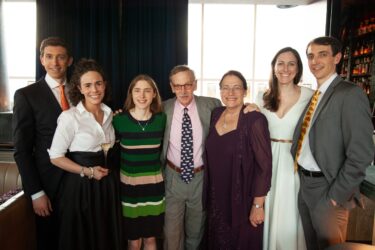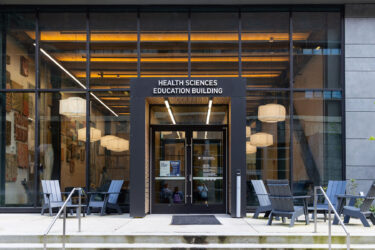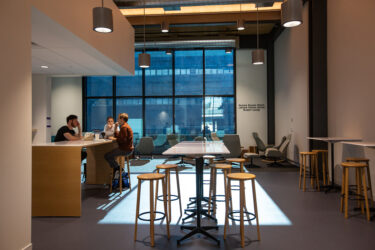Transforming healthcare education: The inspiring generosity of Drs. Gaylene and Leonard Altman
A four-decade faculty member and clinical educator, Dr. Gaylene Altman (she/her) PhD, RN, MN, is author of multiple nursing textbooks, long-time facilitator of clinical education at UW SoN’s world-class Simulation Center, and a distinguished scholar – but her first passion is teaching. Now, her dedication to her students has inspired her and her family’s transformational philanthropic investment in the University of Washington.
“I love teaching undergraduate nursing students…partnering with students to get them to be the best they can be. That’s really been a rewarding experience, watching the transformation from novice to a highly educated nurse.” Consequently, she has received many nursing teaching awards, including one of the University’s highest honors: the Distinguished Teaching Award.
Gaylene’s story has more humble beginnings than the accolades might let on. Yet the whirlwind to follow would keep Gaylene and her spouse, Dr. Leonard (Len) Altman, on the leading edge of both nursing education and practice ever after.
Her journey began, of all places, on a farm in the Midwest.
“I grew up on a farm, milking cows, caring for animals and working on tractors at an early age in the wheat fields. Teamwork was important for survival.” Gaylene shared. “One summer in my sophomore year, my parents let me accept a nurse’s aide position at a local hospital.” The hospital was about 30 miles from the farm. “That was my first exposure to nursing, and I knew this was my calling.”
Gaylene’s newfound love of nursing took her to the University of Kansas, where she earned her bachelor’s degree. “Since I needed financial assistance to immediately pursue the next level, I sought schools with financial assistance or any traineeships,” she said. That’s when she learned the importance of financial support for students. “Traineeships were available federally due to the shortage of nurses and I investigated at schools where that assistance was available. The UW was one of those places.”
She leapt right into her master’s degree at the University of Washington.
After completing her degree, Gaylene became involved in the early days of public education about a medical intervention we now often take for granted in today’s public square – cardiopulmonary resuscitation (CPR).
As nurses usually are, she was in the right place at the right time. She was working for a regional medical program when she first received a call from Dr. Leonard Cobb, co-founder of Washington’s first Medic One.
Dr. Cobb had a simple idea that was revolutionary for its time. Create the area’s first 911 program. But they needed professionals to develop and deliver the training. Already an educator and an Intensive Care nurse at Harborview Medical Center, Gaylene was in.
She taught CPR to ski patrol members, first response interventions to firefighters and set up what became known as the “Pink Pig”, a large van outfitted with lifesaving equipment. With the assistance of designated cardiologists, she co-led a program to develop cardiac intensive care units around the state and in Idaho, Montana, and Alaska.

Altman-Bouska Family
Len Altman was a medical intern at the time, before they were married, and was often on board the Pink Pig when they were dispatched to live-saving calls.
Today, Len is a clinical professor in the UW Division of Allergy and Infectious Diseases and has authored many publications, including several textbooks.
In many ways, the inspiration and tenacity for improving health care that characterized those early days in the Pink Pig never really faded for both Gaylene and Len.
True to her commitment to nursing education and research, Gaylene received her doctoral degree in 1992 – and hasn’t stopped advocating for nurses, nursing students, and the patients they serve since.
“Everyone will see a lot of changes in their career, but this was a unique period of time, especially in nursing,” Gaylene shared. “I’ve often thought I should write a book about the changes I have seen in my 50 years as a nurse. Because physicians are recognized, but sometimes they don’t recognize how nursing was involved in the groundbreaking parts of changing healthcare.”
Together, the Altmans have forged a lifelong legacy of supporting the educational journey of students who choose to care for others in medicine and nursing.

Exterior building shot
This belief in the importance and value of healthcare education underpins the philanthropic support the Altmans have generously provided to UW. The recently opened Health Sciences Education Building, for example, is a promise made real of a bold and innovative interprofessional and transdisciplinary education accessible to all. The building is a technologically sophisticated space dedicated to interactive classroom and study spaces for students of all UW health sciences schools – nursing, medicine, dentistry, pharmacy, public health, and social work – to promote active learning, interdisciplinary education, and collaboration.
“This is how we’re going to improve patient care,” Gaylene asserts, “if we have whole teams looking at the big picture at the same time and saying, ‘Oh, I see this. I see that.’ I think the new building is an ideal place to have that happen.”
Gaylene saw, starting with her days at the University of Kansas, the power of small, interdisciplinary teams out in the community together, seeing patients as a team and helping direct the best care from all team members.
Transdisciplinary education in the context of healthcare brings different health science disciplines into harmony, building new knowledge and drawing connections that otherwise may not have surfaced for the provider or the learner – more so than would be possible in highly siloed educational environments, where only one discipline is emphasized.

Gaylene Bouska Altman and Leonard Charles Altman Student Lounge
As University of Washington Laureates Gaylene and Len believe fervently in the power of a transdisciplinary health sciences education. This belief, founded in practical observation and extensive education, drove their generous philanthropic investment totaling $500,000 in the Health Sciences Education Building. Their passion for creating space and support for the student experience led to the naming of the Gaylene Bouska Altman and Leonard Charles Altman Student Lounge. The Altman Bouska Student Lounge was created to ensure that students also have a place to learn and spend casual time with their peers — both to support students’ well-being and to foster cross-school camaraderie.
“If we create rooms in the new building that are really set up as interdisciplinary training systems, that’s where things are going to happen, ideas to transform health care,” Gaylene said. “I see the future as trying to bring groups together.”
The Altman family’s generosity and commitment also shines brightly beyond the walls of this building. The family has made additional philanthropic investments in the School of Nursing that one simply can’t help tying back to a crucial moment in Gaylene’s educational journey – when she made the path-defining choice of UW for her master’s.
Just as Gaylene affirms that the financial assistance offered by UW clinched her choice to attend, Gaylene is firm in her conviction that other students from rural communities ought to have access to the same choice. Len has been committed to funding fellowships in his specialty as well as travel awards for new faculty. Gaylene has been committed to funding scholarships for students from rural areas at both the University of Washington and Kansas.
Today, thanks to supporters such as the Altmans, the Health Sciences Education Building is creating an environment where health sciences students learn to work as equitable members of a care team and provide quality comprehensive care for their future patients.
This opportunity is only made possible by the generosity of lifelong practitioners and humanitarians, individuals who not only envision a better future for healthcare in Washington but also possess the strength of will to see it through.